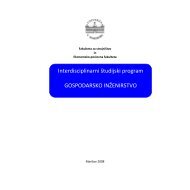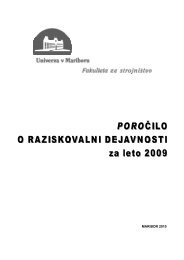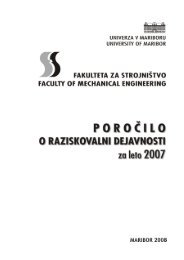University of Maribor version 01 22.4.2009 - Fakulteta za strojništvo ...
University of Maribor version 01 22.4.2009 - Fakulteta za strojništvo ...
University of Maribor version 01 22.4.2009 - Fakulteta za strojništvo ...
Create successful ePaper yourself
Turn your PDF publications into a flip-book with our unique Google optimized e-Paper software.
Information Package on the degree programmes <strong>of</strong> the Faculty <strong>of</strong> Mechanical Engineering <strong>Maribor</strong> Part TWO Page 42<br />
Module courses<br />
FIRST YEAR<br />
A. The 3 compulsory courses <strong>of</strong> the module:<br />
� Mathematics (Selected Topics)<br />
� Rheology<br />
� Intelligent systems for computer aided design<br />
SECOND YEAR<br />
B. Optional courses <strong>of</strong> the module:<br />
The student selects 3 subjects from the set <strong>of</strong> optional courses, at least two <strong>of</strong> them from group B1:<br />
B1. Optional courses <strong>of</strong> this module<br />
� Information systems and computer aided technologies<br />
� Expert systems<br />
� Databases<br />
� Nonlinear computational engineering analyses<br />
� Computational methods in gear design<br />
� Nonlinear fracture mechanics<br />
� Simulation <strong>of</strong> multi-body system response<br />
� Control <strong>of</strong> mechanical systems (Selected Topics)<br />
� Integrated transport<br />
� Thermo-plasticity<br />
� Design for service life<br />
� Strategy <strong>of</strong> maintenance<br />
� Colour design<br />
B2. Optional courses from other modules, study courses and faculties<br />
� optional courses from other modules <strong>of</strong>fered on the FME.<br />
� optional courses <strong>of</strong>fered on any postgraduate study direction on FME.<br />
� optional courses <strong>of</strong>fered on postgraduate study <strong>of</strong> other faculties <strong>of</strong> <strong>University</strong> <strong>of</strong> <strong>Maribor</strong> or other universities<br />
COMPUTATIONAL MODELING OF THERMAL-FLUID TRANSPORT PHENOMENA<br />
Computational modeling <strong>of</strong> thermal-fluid transport phenomena stands for development and use <strong>of</strong> computer programmes in<br />
computing transport phenomena in solids and fluids. Today, computational modeling is becoming an inevitable part <strong>of</strong><br />
development <strong>of</strong> machines, devices and processes with the trend <strong>of</strong> becoming a predominant engineering tool <strong>of</strong> the future.<br />
Computational modeling is not limited only to the field <strong>of</strong> classical mechanical engineering, its use is more and more present also<br />
in process engineering, environmental engineering, electrical engineering, chemical and civil engineering, i.e. in all technical<br />
fields <strong>of</strong> science.<br />
The study programme includes a balanced combination <strong>of</strong> theoretical studies, studies <strong>of</strong> experimental techniques and studies <strong>of</strong><br />
computational methods for solving complex engineering problems. The main part <strong>of</strong> the module is composed <strong>of</strong> in-depth studies<br />
in fluid mechanics, heat transfer and mass transfer.<br />
In-depth knowledge <strong>of</strong> fluid mechanics and heat and mass transfer is one <strong>of</strong> the basis for correct choice <strong>of</strong> the governing<br />
equations, describing physical phenomena in a chosen computational domain. The main attention is focused on Navier-Stokes<br />
equations for compressible and incompressible fluids. A thorough study <strong>of</strong> different turbulence models presents a solid basis for<br />
accurate computation <strong>of</strong> turbulent flows <strong>of</strong> engineering importance. Turbulence models on eddy viscosity concept, presenting the<br />
today's engineering standard, are discussed together with Large Eddy Simulation and DNS. Other important physical<br />
phenomena in the studies are non-Newtonian fluids, multiphase dispersed and stratified flows and conjugate heat and mass<br />
transfer.<br />
Although the current development <strong>of</strong> approximation methods allows computation <strong>of</strong> complex physical phenomena there is still the<br />
need for experimental verification <strong>of</strong> selected numerical techniques and physical models. One <strong>of</strong> the important study aspects is<br />
therefore also acquaintance with modern experimental techniques, including LDA and PIV.<br />
<strong>University</strong> <strong>of</strong> <strong>Maribor</strong> <strong>version</strong> <strong>01</strong> <strong>22.4.2009</strong>





